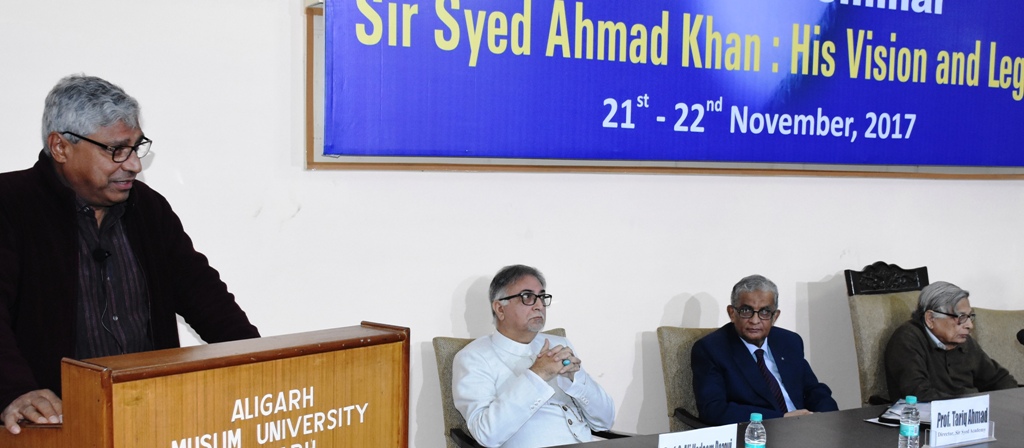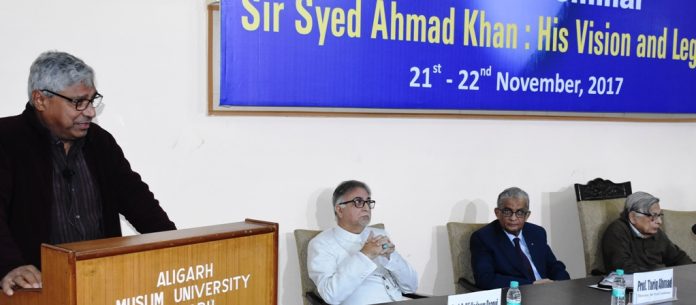TCN News
Aligarh: As part of Sir Syed Bicentenary Celebrations, the Centre of Advanced Study in History and the Sir Syed Academy, Aligarh Muslim University, Aligarh organised a two day national seminar on “Sir Syed Ahmad Khan: His Vision and Legacy” at Sir Syed House, AMU, Aligarh on November 21- 22 2017. Inaugural function of the seminar was presided over by noted historian Prof. Irfan Habib. Prof S. Ali Nadeem Rezavi (Chairman & Coordinator, Centre of Advanced Study, Department of History, AMU) introduced the theme of the seminar. Prof. Tariq Ahmad (Director, Sir Syed Academy) welcomed the guests.

In his inaugural address Prof Aditya Mukherjee said that longest lasting colonial legacy in India has left behind a divided people. Colonial rulers thought that India can’t be a nation and it is merely a geographical expression, as people speaking different languages and practicing different religions can’t make a nation. The emergence of nation states in Europe was based on one nation and one language concept and the colonial rulers looked upon India in the same way as a multi cultural, multi religious and multilingual country like India was beyond their imagination, he said.
This European construct is there behind the historiography of India too and terms of reference like Hindu rule and Muslim rule was used by the European historian, Prof. Mukherjee said, whereas for the British rule they did not call it a Christian rule.
The seed of separation between the two largest communities of India was sown by the colonial masters and formula of separate electorate was applied, which was basic to the two nation theory, Prof. Mukherjee said. While presenting an overview of 19th century, Prof. Mukherjee said that later on in this fashion, Jinnah was patronised by the British colonial rulers.
Describing the political hegemony of colonial rule and events of 1857, Prof. Mukherjee said that Syed Ahmad Khan adopted a middle path and emerged as a major reformer, moderniser and a sharp critic of irrational religious dogma and orthodoxy. Sir Syed had not even an iota of Hindu-Muslim divide in his mind and there were more Hindus in the Executive of “Scientific Society” formed by Sir Syed in 1854 AD, than Muslims, Prof. Mukherjee said. He further said that there were more than 20 percent Hindu students in the MAO College established by Sir Syed which later became Aligarh Muslim University.
Prof. Mukherjee said that Sir Syed was opposed to communal hatred and his opposition to Congress was based upon his thinking that Bengali speaking elite will start dominating Urdu speaking people (both Hindus and Muslims) of North.
Prof. Shireen Moosvi, in her key note address, said that Sir Syed was a moderniser and social reformer and to develop civility and scientific temper he started a journal, Tahzibul-Akhlaq and wrote a rationalist interpretation of Quran. For imparting modern scientific education, Sir Syed advocated adopting English as a medium of instruction, Prof. Moosvi said.
In his short presidential remarks Prof. Irfan Habib said that Sir Syed insisted on modern education, modern ideas and values, and it is time to revive those values and ideas.During the inaugural function of the seminar, a copy of the Bulletin of Sultania Historical Society of the Department of History, AMU was presented to the guests on the dais. In the first session, chaired by Prof S.M. Azizuddin Husain, Prof. Rizwan Qaisar (J.M.I. New Delhi) presented a paper on “Extricating Sir Syed from the cleft stick of Historiographical Approaches”.
He said that Sir Syed is a victim of historiographic interpretations and it is time to re-visit him and his times; there is a difference between Communal Politics and Communitarian Politics, Prof. Rizwan Qaisar said. He informed that Sir Syed wrote two articles in Tahzibul-Akhlaq in which he advised Muslims to give up killing cows. Labelling such a person as communalist is a far-fetched idea. In fact Sir Syed tried to seek good relations with all the communities, Prof. Qaisar said.
Ms Rana Safavi said that there is a need to safeguard Sir Syed’s built legacy.
In the Second session chaired by Prof. Rizwan Qaisar, Prof. S. Zaheer Husain Jafri on “Sir Syed’s Perceptions on the Uprising of 1857: Re-reading of Asbab-i Baghawat-i Hind”, Prof Farhat Hasan on “Sir Syed as a historian: Perception of Time in Indo-Muslim Consciousness”, Prof. Shafey Kidwai on “Sir Syed and Freedom of Expression” and journalist Mr. Manimugdha Sharma (TOI, New Delhi) on “Sir Syed and the Aligarh Movement in the contemporary English Language Press” presented their papers.
In the third session on the following day, chaired by Dr. Rakhshanda Jalil, papers were presented by Dr. Anirudh Deshpande from Delhi University on “Ideological Contours of Colonial Education in India in the 19th Century: A Critical Summary”, Prof. Mazhar Husain from JNU on “Religion, Science and Curriculum: Re-imaging Islamic Tradition in Colonial India” and Prof. Mohammad Sajjad on “Safeguarding Qaum’s Future: Sir Syed’s Evolving Position about Modern Education”.
In the fourth session chaired by Prof. Farhat Hasan, Dr. Rakhshanda Jalil on “Sir Syed Ahmad Khan and Taleem-e-Niswan: The struggle for a ‘Normal School’ for girls”, Dr. Shadab Bano on “Reforming women and the ‘Reform’: Muslim Reform in the 19th Century” and Dr. Ayesha Munira Rasheed on “Sir Syed in the era of Post Truth” presented papers.
In the fifth and last session chaired by Prof. S. Zaheer Husain Jafri, papers were presented by Prof. S.M. Azizuddin Husain on “A Comparative Study of Monuments of Delhi in Pre & Post 1857 in the light of Sir Syed’s Asar us Sanadid”. Prof. Asif Naem also presented the paper on “Qila-i-Mualla in 19th Century as described in Asar-us Sanadid” and Dr. Gulfishan Khan on “Art, History & Architecture in Pre-1857 Delhi”. In the valedictory session, Prof. S. Ali Nadeem Rezavi (Chairman & Coordinator, CAS, Department of History, AMU) proposed vote of thanks.


